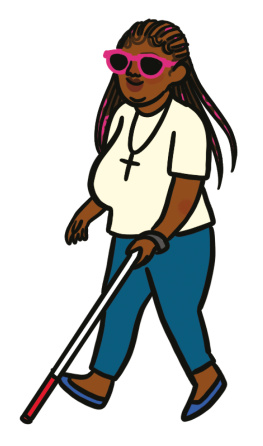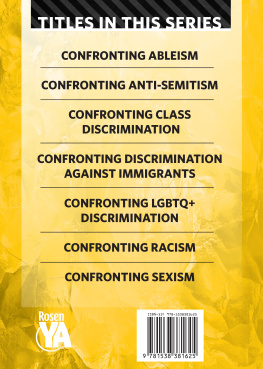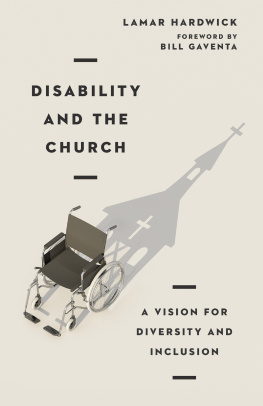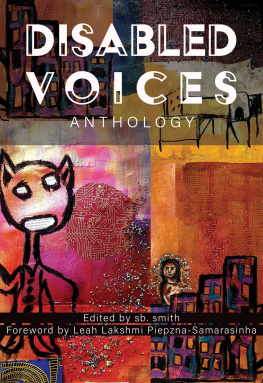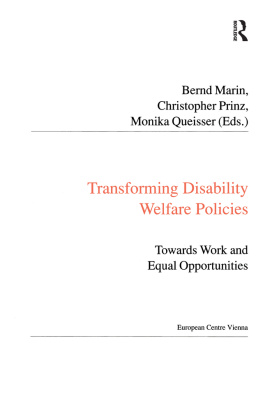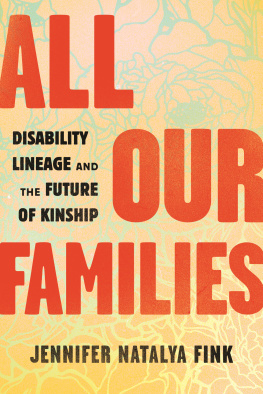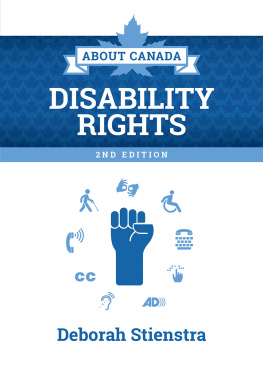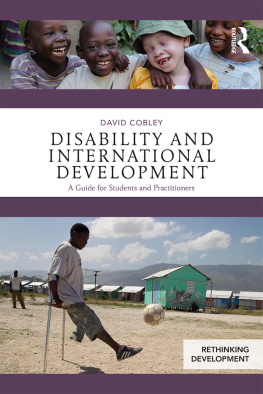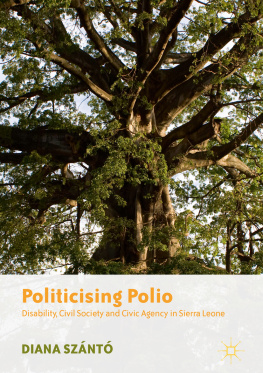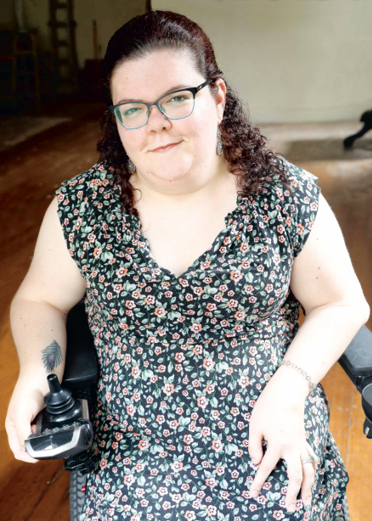Contents
Landmarks
Print Page List
Acknowledgments
I didnt know that a late-2018 interview with writer Kelly Dawson about the added expenses of being disabled would so radically alter the course of the next few years of my life. We became fast friends, and when she invited me to join her in guest-cohosting an episode on disability for the podcast Call Your Girlfriend, I was honestly just thrilled to have an excuse to spend more time talking to someone as cool and totally on-point as she is. As it happens, that podcast was a springboard to this book; and for all of that, I am grateful.
Thank you to my literary agent, Laura Lee Mattingly, for believing in me enough to reach out after listening to that episode of Call Your Girlfriend. Without your sure, steady guidance and ability to steer me in a direction more aligned with my work than even my own initial book ideas, I cant imagine ever having started this writing journey.
Thank you to the incredible team at Ten Speed Press for bringing my manuscript to life. By the time I hung up after my first phone call with my editor, Kaitlin Ketchum, my entire being was buzzing with excitement and certainty that Ten Speed was where I wanted my book to find a home. Kaitlin, I am so truly appreciative of every nuanced edit and encouraging conversation about the complexities of disability, and of your willingness to learn and engage thoughtfully along the way. Thank you to Doug Ogan and Want Chyi for your insightful input and edits throughout the process. Thank you to Serena Sigona for gracefully managing the production of this book. And thank you to Isabelle Gioffredi, Betsy Stromberg, and Sarah Rose Weitzman for designing a book that is so truly beautiful. Thanks also to copyeditor Kristi Hein and proofreader Carolyn Keating.
Thank you to Tyler Feder for bringing my dream book cover to life with your illustrations. Your art is a true celebration of human diversity and it brings me such joy.
Thank you to every single person who so generously gave of their time to share their thoughts, ideas, and anecdotes and allowed me to feature them. While one book simply cannot encompass the wisdom of an entire community, it is because of all of you that I was able to create something that explains why the disability experience is so much bigger than the story of any one person
Thank you also to the disability community as a whole. I know the concept of community is a complicated one, but my respect for all of you is boundless. Thank you for your advocacy, your activism, and your pursuits of justice, and for being unapologetically who you are.
Thank you to my Grandma Edie; Grandma Evelyn; all of my aunts, uncles, and cousins; and my friends who cheered me on relentlessly and never stopped supporting me, even as the contents of this book remained pretty much a complete mystery to all of you as I worked on it. Please know that listing your names would take far more lines in this book than I could possibly fit, but I love you all with my whole heart.
Thank you to my love, Eli, for being my rock through every moment of the book-creation process. For every letter that you wrote to me with emphatic words of encouragement, thank you. For the countless late nights that you spent brainstorming, celebrating my highs, and coaching me through my lows, thank you. For believing in me when putting words on a page felt like an impossible task, thank you. For being my artelligent, funny, wonderful boyfriend, thank you.
And finally, thank you to my parents for loving me through this. I will never have exactly the right words to tell you what it means to have such a patient, unwavering, unconditional support system. Dad, thank you for every piece of practical advice as I wrote, for all the jokes and hugs to ease my moments of whining and complaining, and for always knowing how to get me to calm down now, dont stress, take it easy. Mom, thank you for sitting with me and arguing aboutI mean, carefully discussingthe manuscript line by line, comma by comma, helping to shape this book into what it has become. I love you both, Mom and Dad, more than anybody can.
About the Author
Emily Ladau is a disability rights activist, writer, and speaker whose career began at ten years old, when she appeared on Sesame Street to educate children about her life with a physical disability. Emily graduated with a BA in English from Adelphi University and now serves on the schools board of trustees. In 2017, she was named one of Adelphis 10 Under 10 Young Alumni. In 2018, she was awarded the Paul G. Hearne Emerging Leader Award from the American Association of People with Disabilities.
Emily is the editor in chief of Rooted in Rights, a platform amplifying authentic narratives on the disability experience, and cohosts The Accessible Stall podcast, a show that delves into disability issues. She also runs a business providing consultation, editorial services, and communications strategies for multiple disability-related organizations and initiatives.
Emilys writing has been published in the New York Times, SELF, Salon, Vice, and HuffPost, and she has served as a source for NPR, Vox, and the Washington Post. Emily has spoken before audiences across the United States, from the U.S. Department of Education to the United Nations, with a focus on disability identity, sharing our stories, and harnessing social media as tools for people to become engaged in disability and social justice issues.
More about Emilys work can be found on her website, WordsIWheelBy.com. Follow her on Twitter at @emily_ladau.
Conclusion:
Calling All Allies and Accomplices
Im really glad that we stuck together through this learning process, but heres the thingthe process isnt over. Neither of us is an expert on disability simply because we made it to the end of this book. Although I included perspectives from other people throughout, ultimately this book remains one womans take on disability. Theres no way to become a master of such diverse human experience, but we can and should keep learning. And we can apply that learning by taking meaningful action, otherwise known as allyship.
Ally is one of those buzzwords that gets thrown around a lot, frequently among well-meaning people who want to be supportive of marginalized communities. Obviously, this is super-important, but its even more important to remember that ally isnt an official label or title. Simply saying Im an ally to the XYZ-marginalized community isnt how allyship works. In fact, being an ally is really more of a show, dont tell kind of thing. But how can we show allyship?
First, lets reflect on your reasoning and motivation for wanting to be an ally to disabled people. Is it because you feel pity toward people with disabilities? Im hoping that after reading this book, you recognize that feeling that way is pretty condescending. Do you perhaps feel guilty for having some form of nondisabled privilege that people in the disability community dont share, so you want to make up for it? Sorry to burst your bubble, but thats more about self-interest than solidarity. Are you feeling altruistic and want to help? Youre moving in the right direction, but lets pause for a moment.
While talking with me about the deeper meaning of allyship, Autistic activist Reyma McCoy McDeid dropped a hard-hitting question. If you do not belong to a particular marginalized community and you want to help that community, why do you associate the word help with that community? she begins. That really needs to be unpacked before you approach that community. Really good question. If I had to venture a guess, Id say it has a whole lot to do with the fact that both helplessness and being in need of help are two of the overarching stereotypes associated with disability. This means that the first step to being an ally is unlearning this misconception and recognizing that disabled people arent in need of saving. Were in need of a world that recognizes our rights and our humanity without question.

